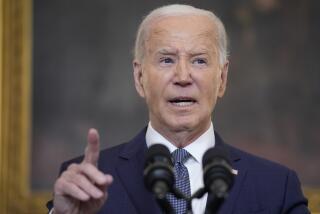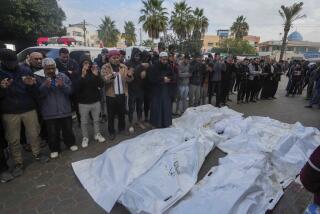Allawi Seeks to Widen Cash-for-Arms Deal
- Share via
BAGHDAD — Iraqi Prime Minister Iyad Allawi announced plans Monday to extend a cash-for-weapons program for insurgents in the capital to cities nationwide.
The initiative is part of an effort to quell violence in Iraq as it heads toward January parliamentary elections. President Bush and other U.S. officials have said the vote is a critical part of building democracy in Iraq and inspiring political change across the Middle East.
On Monday, though, Bush acknowledged that the vote could lead to the seating of a fundamentalist Islamic government. If that happens, “I will be disappointed. But democracy is democracy,” Bush said in an interview aboard Air Force One with an Associated Press reporter. “If that’s what the people choose, that’s what the people choose.”
Violence continued Monday in several areas. The Islamic Army in Iraq, a militant group, claimed to have beheaded two Macedonian hostages. A car bomb in the northern city of Mosul killed one person, a day after a car bomb there left five Iraqis dead, the U.S. military said.
U.S. forces also said they staged new attacks against insurgent strongholds in Fallouja. The military reported the death of a U.S. soldier from a noncombat injury in Diyala province, northeast of Baghdad.
The Iraqi government launched the cash-for-guns offer in Sadr City as part of a deal to end weeks of fighting in the Shiite Muslim district of Baghdad. It has twice extended the deadline for militants there to hand in their weapons.
On Monday, Allawi told the National Council, a government oversight body, that the program was going so well, he wanted to extend it nationwide.
Iraqi officials hope Sunni Muslim leaders in Fallouja can be persuaded to negotiate a similar weapons buyback deal. On Sunday, U.S. troops there fought a nine-hour battle and launched airstrikes. Hospital officials said four civilians were killed and 12 wounded, with a child among the dead.
The U.S. military said that on Monday it destroyed several safe houses and weapons storage sites in Fallouja that were linked to militant leader Abu Musab Zarqawi. The statement did not specify whether the attacks were airstrikes, although such attacks have been launched frequently against the city in recent weeks.
Iraqi officials say they are seeking a peaceful solution to the standoff in Fallouja, 35 miles west of Baghdad. But hopes that peace talks could resume there quickly were dashed when the city’s chief negotiator, Khaled Jumeili, ruled out any immediate resumption despite his release from U.S. custody Monday.
Jumeili was detained Friday, a day after talks broke down over the government’s demand that the city hand over Zarqawi, who Fallouja’s clerics say isn’t there.
Jumeili said the U.S. hunt for Zarqawi was a pretext to attack Fallouja, comparing it to U.S. assertions that Saddam Hussein had weapons of mass destruction before last year’s invasion.
“I’m negotiating on behalf of Fallouja people -- civilians, kids, women -- who have no power except by being represented by somebody,” Jumeili told Al Arabiya television. “Since the situation has gotten to this ... we don’t need to talk about negotiations.”
As for the Macedonian hostages, the Arabic-language television channel Al Jazeera broadcast a video from the hostage takers, who said the two men were abducted “a few days ago outside an American base in Iraq.” The broadcast showed parts of the video of the pair and their Macedonian passports and other identification, but it did not show their deaths.
More to Read
Sign up for Essential California
The most important California stories and recommendations in your inbox every morning.
You may occasionally receive promotional content from the Los Angeles Times.













